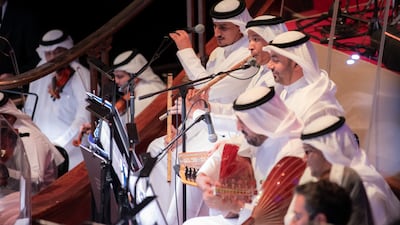For a glimpse into the future of Saudi Arabia’s music industry, step inside the newly opened Saudi Music Hub.
The multi-purpose venue in the heart of Riyadh features recording studios, a performance hall, a music library and ample spaces for rehearsals and workshops.
But it’s in the maze of meeting rooms where some of the most significant steps towards building a thriving music sector are taking place. In one room, members of the International Music Managers Forum – a global network for self-managed artists and their managers – are deep in discussion with the president of its newly established Saudi chapter.
Elsewhere, international producers and festival organisers are meeting Saudi organisations to develop new projects across the kingdom.
Overseeing the activity with quiet satisfaction is Paul Pacifico, chief executive of Saudi Arabia's Music Commission. Operating under the auspices of Saudi Arabia’s Ministry of Culture, the commission's remit is to develop the kingdom’s music sector – from regulating and establishing music institutions to promoting Saudi music domestically and abroad.
It’s a broad mandate, but like the best of music, progress happens when collaboration takes the lead.
"It's the networking effect and it’s about bringing people from different parts of the industry – I am talking about key domestic, regional and international stakeholders – together to have these important conversations," Pacifico tells The National. "In my experience, it seems that every other policy discussion about music begins with someone in the room saying something along the lines of 'if we are able to build the music industry today, we wouldn't have done it the way it is now'. I feel that what we are trying to do here in Saudi Arabia is making that effort to build an industry through a 21st century lens."

Five years since the commission’s establishment, these advances are clear to see and hear.
In collaboration with the Ministry of Education, music classes were introduced in public schools in 2022, starting with children in kindergarten. The Saudi Arabian National Orchestra and Choir, established in 2021, has already performed in major cities including Paris, New York, London and Tokyo. Efforts to preserve the kingdom’s musical heritage are also under way through the commission’s establishment of the Saudi Music Memory Initiative, which reportedly aims to document music and lyrics from Saudi artists dating back to the mid 1980s. Many of these initiatives were showcased and reinforced during December’s Riyadh Music Week, a series of events curated by the commission.
The programme included industry summits such as XP Music Futures and the Music Cities Convention, alongside major spectacles like the 2024 Billboard Arabia Music Awards and the massive Soundstorm music festival.
The scope and ambition already on display have been instructive, Pacifico notes: “Initiatives like Riyadh Music Week put welcome pressure on us domestically to get certain things done. These are big, immovable deadlines – and we all know that without them, things can start to drift.”
While these events bring industry leaders and stars to the kingdom, the foundation of a sustainable music industry is being laid offstage – driven by data analysis and long-term planning. As a former chief executive of the Association of Independent Music in the UK and an accomplished harmonica player, Pacifico says Saudi Arabia’s music sector must be shaped to meet the demands of a fast-changing and tech-driven global industry.
"Great houses are built on strong foundations, and in today’s music industry those foundations are data," he says. "But the global data set – who owns what, who wrote what, who performed on what – is woefully inadequate. In fact, even 10 years ago, the Berklee Institute for Creative Entrepreneurship published a report estimating that about 25 per cent of global music revenues go to the wrong people due to poor data. Now, we’re building a new music industry for the 21st century using 21st-century technology. Saudi Arabia has the opportunity to lead – its data set should be the most accurate in the world. If we build the right digital and physical infrastructure, this could be an extraordinary leapfrog moment for the kingdom.”
Some of the key projects include working towards establishing a local collective management organisation to collect royalties for commercially used work and collaborating with the Saudi Authority for Intellectual Property to strengthen copyright regulations. It’s arduous and painstaking work, but Pacifico believes its impact will leave an immeasurable legacy.
“How do you make ‘fair’ fairer?” he asks. “That’s the real challenge. Mature markets have to break old systems to build better ones. Here, we’re starting fresh. That’s both a responsibility and an advantage.
“Saudi Arabia already has an incredibly rich musical heritage,” Pacifico adds. “Our job is to ensure that value is properly recognised, reflected and compensated.”


